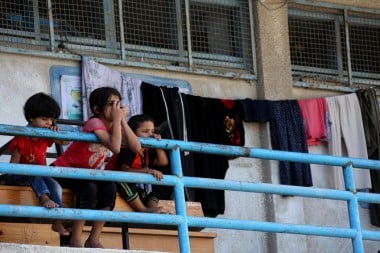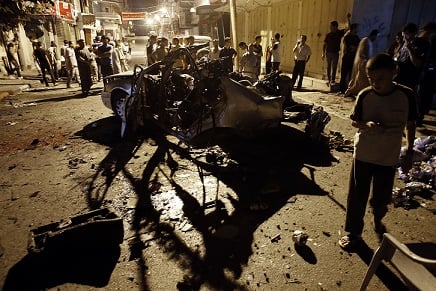

“Nothing is more shameful than attacking sleeping children.”
Those are the powerful words of UN Secretary-General Ban Ki-moon, who yesterday condemned an attack on a UN school in Gaza.
Nineteen people died, and about 90 were wounded, after tank shells tore through the walls of the school on Wednesday. The school, located in the densely-populated Jebaliya refugee camp, was sheltering more than 3300 Palestinian refugee families, the Sydney Morning Herald reports.
Ban called the horrifying attack ‘unjustifiable’, and demanded ‘accountability and justice’. “All available evidence points to Israeli artillery as the cause,” he added.



Top Comments
So hear's what actually happened at that UN site:
UN Involvement in the Israeli/Palestinian Authority War
The United Nations Relief and Works Agency, a UN organization “providing humanitarian relief” in Gaza, said they found rockets hidden by PA terrorists inside a “vacant” school earlier in the week. This is the second time the UNRWA has been found to have PA’s rockets stored in UNRWA facilities.
This time the rockets were found in an “unused” UNRWA building situated
between two other UNRWA schools that are being used to host 1,500 displaced people.
Also this time, instead of returning the rockets to the PA, as the UNRWA did with that prior cache,
UNRWA staff withdrew from the area.
(NOt PA - Hamas)
And abandoned those 1,500 refugees the UN was pretending to shelter.
One thing that needs to be remembered is that Israel is in a very tough neighbourhood and it doesn't really make sense to judge them by western standards. OK, by first world standards they are trigger happy, take no real care to avoid civilian casualties and don't even bother pretending to investigate things that in a first world army would result in a court martial. But compare them with any other army in the Middle East with the possible exception of Jordan and their restraint is extraordinary. The Syrian Army has killed around 150,000 civilians in their civil war with much less military capability than the IDF. If the Israelis really wanted to kill civilians they could reach Syrian targets within weeks. I don't think the Israelis are remotely serious about making any compromise for peace and regard their criticism of Palestinian tactics as hypocrisy but remember the first war they lose is the last and they know it. For all its faults, Israel has the highest standard of human rights in the region and even the plight of Palestinians while no fun is better than in any other country they inhabit.